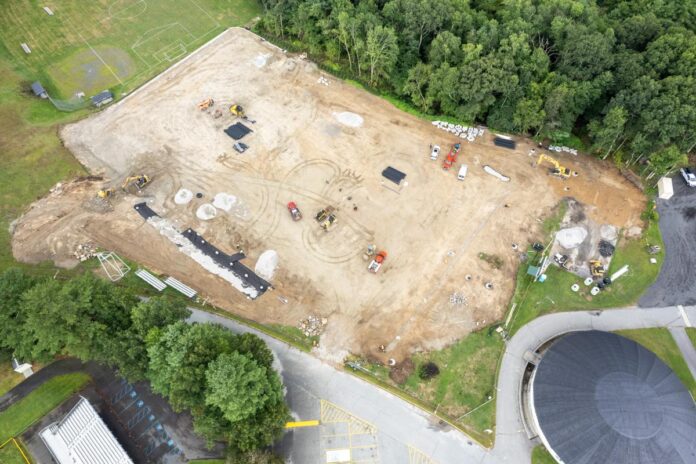BURRILLVILLE – A state Superior Court judge has denied a preliminary injunction preventing installation of a synthetic turf field at Burrillville High School, effectively allowing the project to move forward after a nearly eight month legal delay.
The ruling notes, however, that the project must still go before the Planning Board, and a public hearing for a combined master/preliminary plan submitted by the town in conjunction with the Burrillville School Department has been set for Monday, April 28 in the BHS auditorium.
The decision, issued on Friday, April 25 by Associate Justice Melissa Darigan, has been hailed as win by proponents of the project, halted last fall by a restraining order associated with the lawsuit. Resident Roberta Lacey filed the litigation citing concerns that the synthetic turf could discharge chemicals into town drinking water. Town officials, meanwhile, have pointed to tests concluding that the trace amount of chemicals found in field materials do not pose a threat to public health.
The 17-page ruling notes that the effort to install an artificial turf field in town has been under consideration since 2015, and that the Town Council and two committees collectively held 40 public meetings to plan for the project. In December of 2023, the town signed a contract with FieldTurf USA, Inc. to sell and install the turf at Gledhill Field, with athletic improvements also set to include new lighting, an ADA-accessible viewing plaza, a six-foot-wide walking path and a 1,000-seat grandstand.
Work on the field at the East Avenue school began in June of 2024, with the the turf itself slated for installation last fall.
But in September, Lacey filed a legal complaint stating that the project should have been brought before town Planning and Zoning Boards as the field would be installed in an aquifer overlay zone, and that PFAS, or per- and polyfluoroalkyl substances from the turf could pose a risk to residents. Darigan granted a temporary restraining order allowing the suit to move forward and bringing construction to a standstill through the winter.
The litigation has led to tensions between local environmental advocates and town officials, who note that a report commissioned last year by consulting firm TRC found that “the artificial turf does not represent a human health risk to those using the artificial turf ballfields and it does not pose a risk to the environment, the groundwater, the surface water, and the aquifer.”
Opponents, meanwhile, have pointed out that state and federal standards governing PFAS, known as forever chemicals, are continually changing. Used in industry and consumer products since the 1940s including many common household items, the chemicals can stay intact for thousands of years and currently, only 40 of some 15,000 are regulated.
Ultimately, Darigan ruled that the court could not act beyond the current law, noting that PFA levels found in the turf were “orders of magnitude below,” all applicable EPA standards.
“While the court understands and appreciates the rapidly evolving nature of the regulatory standards governing PFAs, it is not the province of the court to determine its own regulatory standards and enforce them,” the decision notes. “That role belongs to the EPA. The court can only make factual determinations with the research as it stands today, not enforce maximum contamination levels that may or will enter into effect in future years.”
The judge did not repudiate the claim that PFAS could potentially leach into the water, but rather questioned if the attorneys had proven that Lacey stood to suffer irreparable harm from it, as required under the legal standard. Lacey had requested injunctive relief to stop the installation through her attorneys Michelle Hawes and Marisa Desautel of Desautel Browning Law.
Darigan noted that a party seeking such a legal remedy must demonstrate irreparable harm is “presently threatened or imminent,” and that expert testimony had not proven that chemicals from the field would travel into Lacey’s well water.
“This court cannot find that harm to Ms. Lacey is imminent or presently threatened,” notes the decision, describing the case as “filled with uncertainties.”
The ruling notes that Lacey had met the burden of proof, however, regarding why the installation needed to go through administrative review.
“Under the town of Burrillville Zoning Ordinance, this type of project was required to go through the proper administrative channels, which would be the town’s Planning Board,” it states.
The town had originally scheduled a Planning Board hearing for April 7, but Town Manager Michael Wood later issued a statement saying that some “small but potentially problematic issues” had been discovered in the initial application.
The rescheduled hearing will take place at the school at 425 East Ave. starting at 7 p.m. on Monday, April 28. An agenda for the meeting can be found here.









